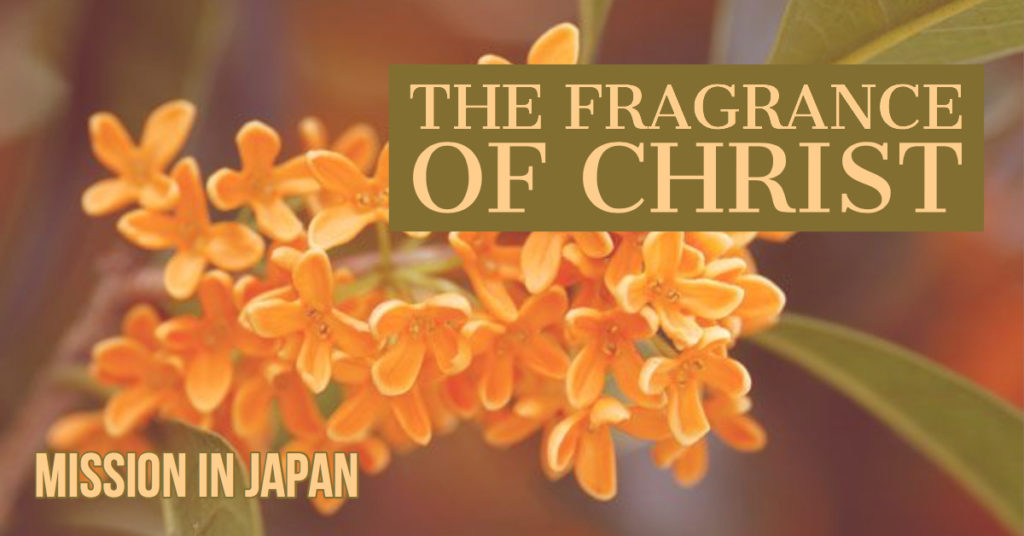The Fragrance of Christ
One thing I like about late September in Japan are the Kin-moku-sei trees (osmanthus) in blossom. The flowers are small and hardly visible hidden amidst the dark green leaves. But the fragrance is so special that I find myself taking a deep breath to catch more of this seasonal blessing.
I scan the surroundings to find where the fragrance is coming from. It is hard to locate the source, though I know the tree is near. As I continue walking, I find that I have passed beyond its reach. When I have the time I retrace my steps to be blessed once again by the unimposing and yet life renewing fragrance. This Kin-moku-sei blessing is a symbol for how I see the church involved in Japanese society today.
Since April I have been teaching at J.F. Oberlin University in Tokyo. I face 450 students each week. My subject is “Introduction to Christianity.” It is a required course for all incoming freshmen. My audience has had almost no experience with the subject. They are a bit uneasy because they are asking themselves, “Why do I have to take this course? I wish it wasn’t required. I have no interest in the subject. What am I to expect from the class?” I can sense their ambivalent feelings. My job is to help them understand the legacy of the Christian church with all of its complexities and contradictions, and to connect that history with the founding of the Christian institution where they now study. Another role I play is to dialogue with them and to relieve their fear and anxiety.
J.F. Oberlin University was founded by a remarkable Christian named Yasuzo Shimizu. In 1917 Shimizu went to China and started a school for slum girls in Beijing. He committed himself to educating the poorest and most vulnerable children, not only teaching them how to read, but also helping them to gain skills for income generation. He managed the school, even as conflict grew between Japan and China and finally erupted into war. The Chinese, Korean and Japanese children at his school were treated equally. He had a special heart for the Korean children who, at the time, were without a homeland. He called them by their Korean names, and encouraged them to take pride in their ethnic identity. Shimizu stayed in Beijing until 1945 when Japan lost the war, and all facilities in China were placed under Chinese government control. Shimizu returned empty handed to Japan, but within five days he had secured land outside of Tokyo to build a new school and church. For the first three sessions in class I tell Shimizu’s story. Many of my students are captivated and glad to learn that J.F. Oberlin was founded by a Japanese who had a good heart for children in east Asia. I am particularly happy to be able to introduce Christianity through this living example of a Japanese man who lived out his faith in the context of East Asia.
Japanese young people for the most part are ignorant of Christianity, and want nothing to do with it. My students are afraid that I will try to brainwash them with Christian values. I acknowledge their feelings, but also remind them that ignorance breeds fear. Maybe some students have had unpleasant experiences with religious groups that push their brand of religion. I tell them however, that university is a place where they can engage the world with a critical eye, and learn about different cultures and religions. Shimizu’s life story is a compelling and non-threatening way to get them thinking about how they want to live their lives. My hope is that the witness of Christians like Shimizu can help my students gain a deeper understanding of the Christian principles that are at the heart of this Christian institution. I also hope that their learning will open new horizons such that “the truth will set them free.”
Christianity in Japan is like a fragrant flower. My students will pass through this institution and in several years will enter the work place. Most of them may not have any further encounter with Christianity. My hope is that their learning here at J.F. Oberlin will be like the gentle blessing of the Kin-moku-sei . I call it the fragrance of Christ. They were touched by it, blessed by it, and thankful for the brief encounter. It’s up to them whether they want to retrace their steps and allow for a more intentional encounter – an encounter that I hope is life giving and refreshing.
PS: You might be wondering how the university got its name. Shimizu studied at Oberlin College in Ohio for two years. He was inspired by the French Lutheran pastor and educator Jean Frederic Oberlin who’s motto was “Learning and Labor.”
Jeffrey Mensendiek serves with J.F. Oberlin University in Tokyo, Japan. His appointment is made possible by your gifts to Disciples Mission Fund, Our Church’s Wider Mission, and your special gifts.

